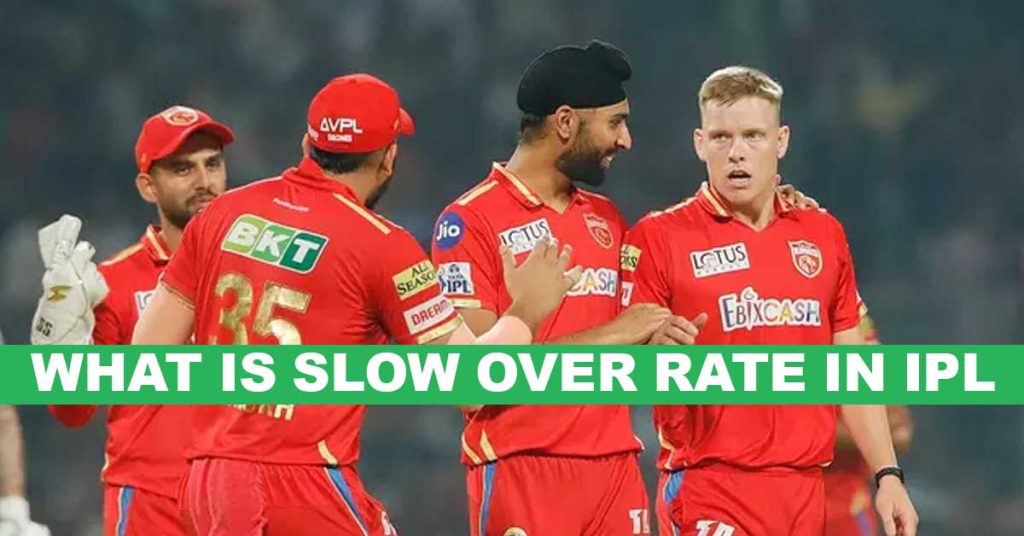In the IPL, a team is required to bowl 14.11 overs per hour, ensuring that the 20th over finishes within 90 minutes of the start of the innings. Let’s delve into the concept of slow over rates in IPL and international cricket.
Understanding Slow Over Rate
A slow over rate in cricket occurs when the bowling team fails to complete their overs within the designated time. The “over rate” refers to the average number of overs bowled by the fielding side in one hour. According to International Cricket Council (ICC) guidelines, the expected over rates are 15 overs per hour in Test matches, 14.28 overs in One Day Internationals (ODIs), and 14.11 in T20 Internationals (T20Is). In ODIs, teams have 3.5 hours to bowl 50 overs, while in T20 matches, they must finish 20 overs in an hour and 25 minutes.
Penalties for Slow Over Rate in IP
When teams fail to meet these over rate benchmarks, it is classified as a slow over rate. The penalties can include fines and player suspensions, depending on the match’s governing body and specific circumstances. For the last five overs of a match, the fielding team loses one fielder from outside the 30-yard circle, among other penalties.
Umpires take several factors into account when assessing the over rate, including time lost due to player injuries, third umpire consultations, and time wasted by the batting side.
In ODIs and T20Is, being up to two overs short is categorized as a “Minor Over Rate Offence,” while being more than two overs short is classified as a “Serious Over Rate Offence.” In Test matches, being up to five overs short is a “Minor Over Rate Offence,” and exceeding that is a “Serious Over Rate Offence.”
In August 2023, the ICC penalized England and Australia during the Ashes series, deducting World Test Championship points and imposing fines due to slow over rates, resulting in England losing 19 points and Australia losing 10 points. Each team was docked one point for every over bowled less than the stipulated time.
In December 2023, India faced a 10% fine of their match fee and a deduction of two World Test Championship points for their slow over rate during the first Test against South Africa in Centurion.
The regulations for slow over rates are implemented to maintain a reasonable pace of play and ensure that matches proceed without unnecessary delays.
Slow Over Rate in the IPL
The IPL 2023 faced significant challenges with slow over rates, resulting in many matches exceeding the four-hour mark. Factors contributing to this issue included the Decision Review System (DRS) and the number of extras bowled.
In the IPL, teams must complete 14.11 overs in one hour, ensuring that the 20th over concludes within 90 minutes of the innings’ start. This timeframe includes two strategic timeouts of 2.5 minutes each but does not account for time taken for DRS reviews, umpire consultations, or player injuries.
When a team violates the over rate rules, they lose an extra fielder outside the 30-yard circle. For a first offence, the captain is fined Rs 12 lakh, which doubles for a second offence. Each player in the playing XI is also fined Rs 6 lakh or 25% of their match fee, whichever is lower.
In IPL 2023, Royal Challengers Bangalore (RCB) were penalized for slow over rates in two matches. Stand-in captain Virat Kohli was fined Rs 24 lakh for the second offence, while each player in the XI faced fines of Rs 6 lakh or 25% of their match fees. Kolkata Knight Riders (KKR) faced similar penalties twice as well.
Instances of Slow Over Rate in IPL 2023
| Team | Opponent | Captain | Fine |
|---|---|---|---|
| RCB | LSG | Faf du Plessis | Rs 12 lakh |
| RR | CSK | Sanju Samson | Rs 12 lakh |
| RCB | RR | Virat Kohli (stand-in) | Rs 24 lakh |
| KKR | PBKS | Nitish Rana | Rs 12 lakh |
| KKR | CSK | Nitish Rana | Rs 24 lakh |
Problems Caused by Slow Over Rates
- Delayed Match Progression: Slow over rates can cause delays in matches, which can inconvenience players, spectators, and broadcast schedules.
- Impact on Team Strategies: Slow over rates can disrupt team strategies as captains may need to adjust their plans due to limited time.
- Fatigue Among Bowlers: Bowlers may become fatigued and less effective due to prolonged spells caused by slow over rates.
- Loss of Momentum for Batting Teams: A slow over rate can create an unfair advantage for the batting team as it disrupts their momentum, especially in the death overs.
- Negative Influence on Young Cricketers: A slow over rate without penalties may set a bad example for young cricketers, potentially encouraging them to adopt similar practices.
The Stop-Clock Rule
In December 2023, the ICC introduced a stop clock rule for men’s ODIs and T20Is as a five-month trial. This rule is intended to ensure matches stay within time limits and operates during intervals between overs. After each over, a 60-second countdown begins, requiring the fielding side to start the next over promptly. Failing to do so results in warnings, with a third violation leading to a five-run penalty.
Exceptions to the stop clock rule include instances when a new batter arrives, during drinks breaks, or when a player is injured and requires treatment.
The permanent integration of the stop clock into international cricket and its potential adoption by the IPL is yet to be finalized.
